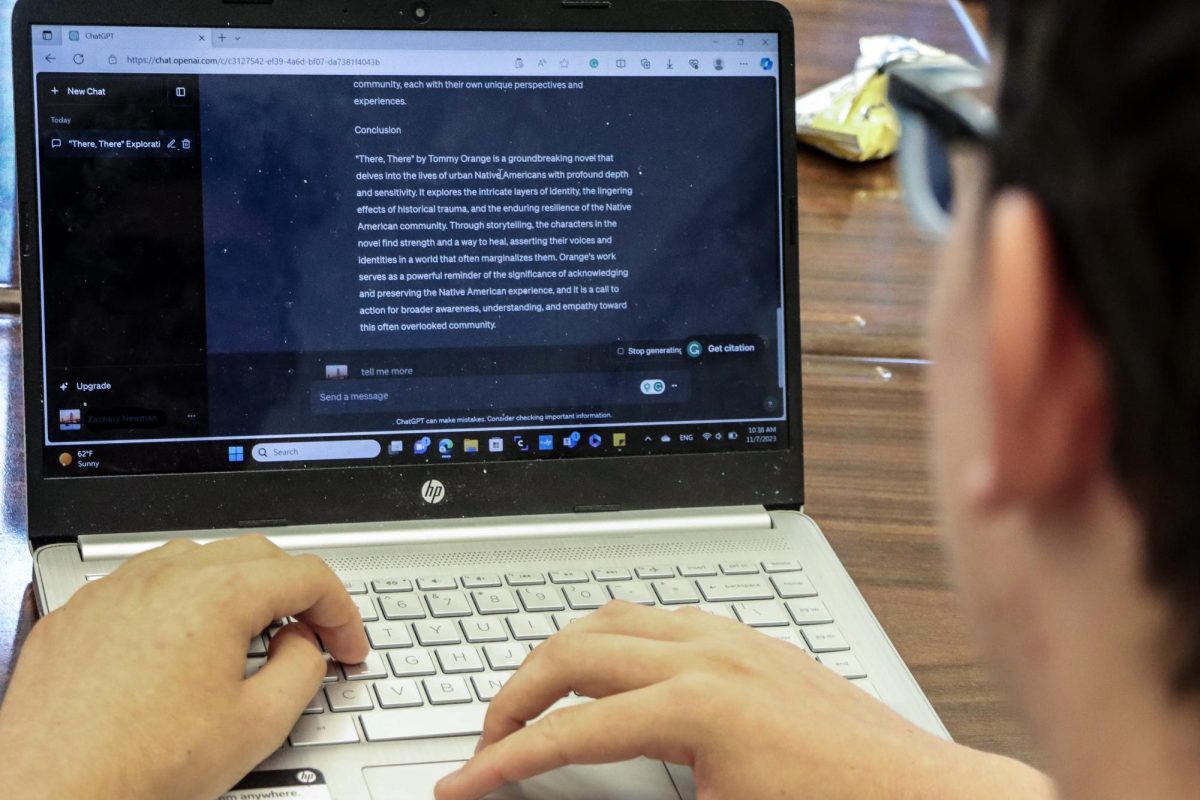ChatGPT, the chatbot software launched by Open AI in November 2022, continues to challenge the principle of academic integrity as students find novel ways to plagiarize their work without detection.
Namely, in January 2023, a Princeton graduate released GPTZero, a resource to detect ChatGPT usage in intellectual settings. But the tool has done quite the opposite — students can now use GPTZero to check if their plagiarized work will be flagged before they turn it in.
Despite administrative software like Turnitin, which teachers now use to scan for AI, students are finding ways to avoid AI detection. An anonymous source claimed they knew a strategy to evade getting caught with AI in their essay.
“It’s really easy. You use ChatGPT to generate an essay using the given prompt. [Then], copy and paste the essay on a paraphrasing website, like Quilbot, to get a new essay [which] helps your essay [be] detected as human-written. When you have your completed essay from the re-worder, [use] GPTZero to [ensure] there is no more ChatGPT detection. In most cases, there won’t be any but if there is, you just rephrase those sentences. GPTZero basically shows you what you need to fix before turning your paper in,” the anonymous source said.
Using this approach, the student received an “A” on their English essay. Although the student feels they are a proficient writer, they claim they use the tool because of their laziness and mentality to “just get it done.”
“It’s not like I can’t write an essay using my own words. I just think [that] if I can get [the essay] done in minutes and receive a good grade, why don’t I just do that?” the anonymous source added. “There is nothing stopping me and it’s not like I’m getting caught and facing consequences. I don’t even need English for my intended major.”
Reliance on ChatGPT is especially alarming for the English department, where the majority of students’ grades are dependent on their writing abilities.
“If they’re [a student] avoiding [AI] detection, there’s not much I can do for them,” said Advanced Placement (AP) English and Language Composition and English 4 teacher Tim Larkin. “If they’re a kid insistent upon not actually learning anything and lying their way through school in an effort to be particularly underprepared for a university that might admit them on the basis of false grades, [then] they have problems I can’t fix.”
As Larkin alludes to, even with strict protocol in English classrooms, some students will still rely on ChatGPT.
“Although I write my essays by myself, I’ll put the essay into ChatGPT after and have it reword everything so that the essay sounds better. The words will be more sophisticated and the structure will also be more clear. I feel that it’s still my own work, but a better version of it,” another anonymous source said.
As a result, the student was one of the few who received an “A” on their English project. Whether they deserved the grade or not was another question.
College of San Mateo and Burlingame Introduction to Business Professor Colin Johnson shares a similar perspective. Although several college classes, including Introduction to Business, allow the use of AI for research purposes, Johnson noted that it’s still crucial to learn how to research and not rely on technology to do everything.
“In this course, it doesn’t require that you demonstrate that you can write a coherent sentence because if you can get a coherent sentence generated that accomplishes the goal, that’s okay. But, if I were teaching a course that had the intention of instilling the capacity to write a coherent sentence, or to think critically, then I wouldn’t want AI to supplant the individual’s learning and development process,” Johnson said.
Furthermore, Johnson emphasizes the importance of life skills gained in high school and incorporating them into college and beyond.
“High school is where the rubber meets the road because one should be able to get out of high school and live their life… the writing and mathematics skills that I developed, by and large, the ones that I use every day, are the ones that I developed in [high school], and so I can totally understand why high school teachers are freaked out about AI,” Johnson said.
As AI continues to advance and teenagers continue to find unexplored forms of cheating, it may be impossible to avoid an unsteady future built on AI dependence. Even if students receive a desired grade, the letter means nothing in the long run when one can’t complete simple, daily tasks in the future.
“Students sometimes think ‘I just need this for my grade, I don’t care if I get anything out of it,’ but at the end of the day, what students take away from their time in school is totally up to them,” Johnson said. “I want them to succeed and go into the world and be successful individuals but it’s really up to them. They’re only cheating themselves.”
This story was originally published on The Burlingame B on November 14, 2023.




































